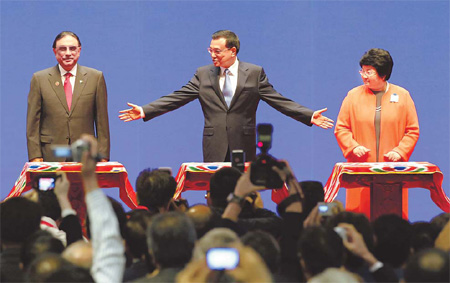Xinjiang to lead nation's new opening-up drive
Updated: 2011-09-02 07:10
By Li Xiaokun and Bao Chang (China Daily)
|
|||||||||||
URUMQI - The process of opening up inland regions to the world will be quickened and the remote autonomous region of Xinjiang will spearhead the drive, Vice-Premier Li Keqiang said on Thursday.
 |
|
Vice-Premier Li Keqiang (C), accompanied by Pakistani President Asif Ali Zardari (left) and Kyrgyz President Roza Otunbayeva, officiates at the opening on Thursday of the first China-Eurasia Expo in Urumqi, capital of the Xinjiang Uygur autonomous region. [Photo/China Daily] |
"Our goal is to give full play to Xinjiang's role as a bridgehead in the process and forge it into a major window and pillar of (China's) opening-up," Li said when addressing a forum at the first China-Eurasia Expo in Urumqi, the regional capital.
The vice-premier, who arrived on Wednesday, said that further engaging with countries in the Eurasian heartland was an important part of the country's overall opening-up, a policy that commenced on the east coast in the late 1970s.
Decades of a booming economy have brought prosperity to eastern and other regions.
"Looking to the future, we will accelerate the opening-up of the interior and border regions as well," Li said.
He said that the central government has drawn up and is implementing a series of favorable policies in Xinjiang in terms of tax, investment in infrastructure, environmental protection, the exploitation of resources and welfare projects.
Li also said that the government is working to accelerate the opening-up of Xinjiang by setting up special economic zones, restructuring local industries, expanding border ports, and implementing financial measures to encourage the use of the yuan in cross-border trade and investment.
"New opportunities have emerged for China and Eurasia countries. The pace of regional economic integration is growing significantly," Li said, adding that China's trade with central, south, and west Asian countries reached $270 billion last year.
Top executives from 33 countries attended the forum as did state and government leaders from the region.
"Today we witnessed the revival of the Silk Road, which used to link the politics, economy and diplomacy of Europe and Asia for centuries," Kyrgyz President Roza Otunbayeva said at the forum.
"We support the comprehensive development of a trade route in Eurasia, which is beneficial for most countries in the region as they have no direct access to the sea," she said.
Hungary's former prime minister Peter Medgyessy, who guided Hungary into the EU in 2004, said he appreciated Beijing's efforts to enhance its less-developed regions.
"In Xinjiang we have seen the effects of such efforts," he said.
Pakistani President Asif Ali Zardari, Azerbaijan's Vice-Premier Abid Sharifov and Kazakhstan's Deputy Prime Minister Aset Isekeshev also attended the event.
Hong Kong Special Administrative Region Chief Executive Donald Tsang and Macao Special Administrative Region Chief Executive Fernando Chui Sai On led delegations to the event.
"I'm very impressed by the number of participants," Turkish Ambassador to China Murat Salim Esenli told China Daily. "It's a clear indication that Xinjiang, as part of China, is going to be the next hub of the economy.
"Xinjiang will catch up fast with the coastal regions in terms of economic development because it already has a very visible growth rate," he said.
The ambassador said 20 Turkish companies are attending the expo.
"Enterprises from Turkey want to understand the business culture through the expo... But I feel that this will not take too long because Turks are originally from Asia. They will find common ground and understand each other."
Cai Esheng, vice-chairman of the China Banking Regulatory Commission, said at the expo that the growth rate of loans in Xinjiang has topped the nation this year. As of the end of July the value of active loans reached 131.6 billion yuan ($20.6 billion), up 28.4 percent from the corresponding period last year.
The expo was upgraded from the Urumqi Foreign Economic Relations and Trade Fair, which began in 1992 and is now the highest-level event of its type in western China.
A key conference held last May by the central government decided to upgrade the Urumqi fair to the China-Eurasia Expo. The event will be held annually from Sept 1 to 5.
The local government has estimated that more than 5,000 foreign guests will visit the expo, four times the number that visited last year's Urumqi trade fair.
Deals at the expo are expected to hit $35.4 billion, a local trade official said on Tuesday.
Hong Kong-based Phoenix TV said that the expo's debut reflects not only the importance the central government attaches to Xinjiang but also "a policy change".
More developed regions, such as Shanghai and Guangdong province, have long been sources of financial support to Xinjiang.
By holding the expo, Beijing has opted to encourage a more open, free and sustainable economy in Xinjiang, it said.
Xinhua contributed to this story.
Hot Topics
Libya conflict, Gaddafi, Oil spill, Palace Museum scandal, Inflation, Japan's new PM, Trapped miners, Mooncake tax, Weekly photos, Hurricane Irene
Editor's Picks

|

|

|

|

|

|






